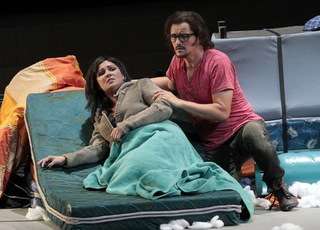|
Back
Yet Another Update of Puccini’s Sad Tale Salzburg
Salzburger Festspiele
08/01/2012 - & August 4, 7, 10, 13, 15* and 18, 2012
Giacomo Puccini: La bohème
Piotr Beczala (Rodolfo), Anna Netrebko (Mimì), Massimo Cavalletti (Marcello), Nino Machaidze (Musetta), Alessio Arduini (Schaunard), Carlo Colombara (Colline), Davide Fersini (Benoît), Peter Kalman (Alcindoro), Paul Schweinester (Parpignol)
Vienna Philharmonic Orchestra, Vienna State Opera Chorus, Children’s Chorus of the Salzburg Festival, Daniele Gatti (conductor)
Damiano Michieletto (director and choreographer), Paolo Fantin (sets), Carla Teti (costumes)

P. Beczala & A. Netrebko (© PdQ)
The biggest challenge in staging La bohème is to capture the opera’s romantic essence without losing it in hackneyed melodrama. Far too often the tale of the poet Rodolfo and his beloved Mimì gets told as a simple love story among naïve youth. The Salzburg Festival has staged something sort of new. Damiano Michieletto updates the action to the present day. Paolo Fantin’s clever sets give us some room for imagination. The young Bohemians live on what seems to be the shelf of a great window casement, with a frosty Paris outside in Act I and the more pleasant weather of the “season of flowers” in Act IV. Act II transpires atop a vast interactive map of Paris, appropriately enough in a Latin Quarter crawling with bourgeois bohemians, “les bobos” in modern Parisian argot, celebrating a depressingly materialistic Christmas. Act III, set on the city’s outskirts, is a grittily realistic superhighway, which rises up at stage back like an overwhelming wave. And it seemed all too appropriate, if somewhat garish, that Mimì should expire on a mattress piled up with the rest of the Bohemians’ belongings by a vengeful Benoît, who seems to have succeeded in evicting them.
The value of innovation, unfortunately, stops there. Michieletto’s effort added little to the original story, and in some ways the updating detracted from it. The sets may have been unusual and different, but it was difficult to accept the ultra-modern characters within Puccini’s sentimental framework. The Bohemians of today are young hipster artists, who look and act the part of what passes for the aesthetic of a subset of a generation of spoiled millennials. Suffused in a milieu of pointless irony, it is difficult to imagine real love sprouting in their midst. The first act “light” that Rodolfo gives Mimì in the dark is not the traditional candle, but a bummed cigarette. Are these creatures really capable of empathy? No one has ever seduced someone of that affect would agree.
Still, even a disappointing production can be brought to life by a starry cast, a quality in which Salzburg abounds. One could scarcely ask for bigger names than Anna Netrebko and Piotr Beczala to headline a Puccini cast. True to form, they both turned in praiseworthy performances that in most respects excelled. The only notable problem occurred at the end of Act I, when, concluding their duet on the word “Amor,” Rodolfo and Mimì go off to join Rodolfo’s friends at Café Momus. Here both singers tried to take the high C. Sadly neither one made it, and the moment was lost. Both recovered strongly in their third act singing, arguably the evening’s most engaging, and were joined in their superb musicianship by the extremely talented baritone Massimo Cavalletti’s Marcello and the excellent Nino Machaidze’s fine Musetta. An additional joy in the cast was Carlo Colombara’s Colline, whose singing of “Vecchia zimarra” enlivened the part far more than the aria usually does, even if it was hard to imagine the hipster poseur parting sentimentally from an article of vintage clothing.
Daniele Gatti is better known for his conducting in heavier repertoires, and his heavy hand did less justice to Puccini’s delicate score. The playing of the Vienna Philharmonic could have reached loftier heights.
Paul du Quenoy
|